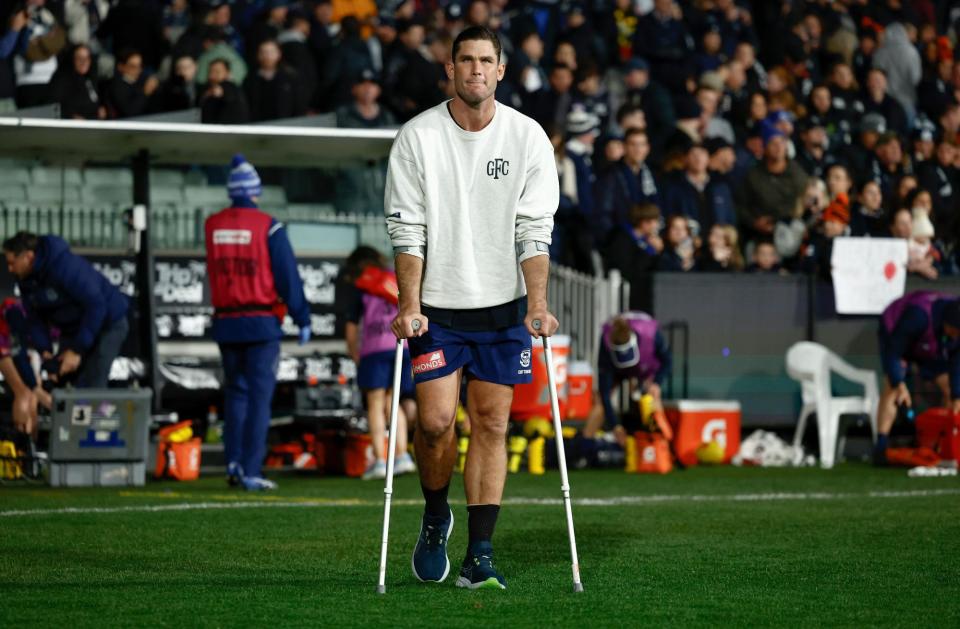From the Pocket: if Tom Hawkins has played his last game, he bows out with nothing more to prove

Tom Hawkins set off on a lumbering lead on Friday night, but collapsed to the ground like he’d been Tasered. You often see it when athletes rupture their Achilles tendon – innocuous, unspeakably painful and when you’re on the wrong side of 30, career threatening. At first it was a suspected Lisfranc injury, one Matthew Richardson said was harder to recover from than a torn ACL. The Cats medical department, as cryptic as ever, described it as an “atypical mid foot joint and ligament injury”. Whatever it is, Hawkins kicked his mouthguard away, finished the night on crutches, and walked into training on Monday in a moonboot.
What’s extraordinary is that he’s made it this far. There were times throughout his career when he could barely get out of a slow trot, when his back was completely stuffed, and when he couldn’t hit the broad side of a barn. His career spanned an era where enormous full forwards gradually became obsolete. But he always found a way to work through his limitations, to adjust to what the team needed and what the game demanded. He became one of the most consistent and reliable footballers of his generation, and was a four-time All Australian after he’d turned 30.
As a junior, he demolished his opponents in school footy, kids he was about twice the size of. But he was a slow burn in senior footy. In a mature, hardened team, he was a long-term project. It took years to shed the puppy fat. He was a bit lost, a bit tentative, and a bit of a tease. His breakout game wasn’t actually the 2011 grand final, as is widely remembered, but the qualifying final against Hawthorn three weeks earlier. That game gets forgotten, but it was at the height of the Kennett Curse, it was football of the highest standard, and it was the first time Hawkins looked at home at the level.
There were so many outstanding individuals playing on grand final day – Selwood, Pendlebury, Swan, Bartel, Scarlett, Enright and many others. Hawkins didn’t win the Norm Smith medal – his tardy goalkicking probably denied him that – but he changed and arguably won Geelong the game. In footballing terms, he matured a decade in half an hour. The way he wrenched the cup away from Collingwood reminded me of Darren Jarman in 1997. And like that day, there was the crippling inertia in the opposition coach’s box. Mick Malthouse didn’t make the move – make the move Mick, make the move, you stubborn, impossible man!
The majority of footballers who’ve played more than 350 games have been wiry, endurance athletes. But this is no sport for 35-year-old, 18-stone men in moonboots. He and the club insist no decision has been made yet. But if this is the last we’ve seen of Tom Hawkins the footballer, he’ll bow out with nothing more to give, nothing more to prove, and nothing but the admiration of anyone who saw him play.
This is an extract from Guardian Australia’s new weekly AFL email, From the Pocket. To get the full version, just visit this page and follow the instructions

